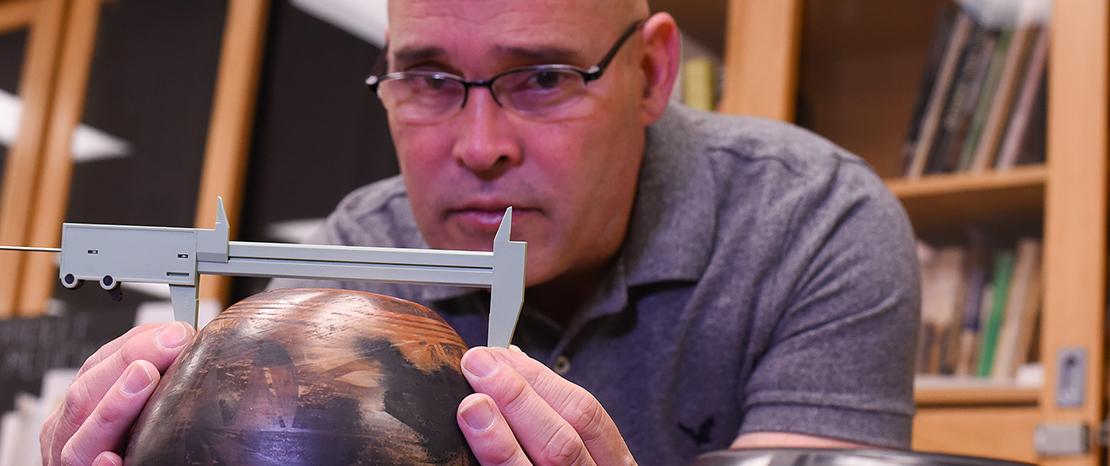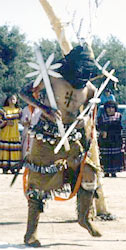
Southwest Studies
 The disciplines of sociology and anthropology, combined, offer a holistic approach to the study of humankind. The program offers both bachelor of arts and bachelor of science degree options with four possible emphases: sociology, anthropology, criminology, and American Indian studies. The region’s long and varied human traditions, dating from the prehistoric past of 10,000 years ago with Clovis and Folsom cultures to the 21st century mixed-culture traditions, provide an excellent natural laboratory for socio-cultural studies. The program emphasizes student participation in field and campus laboratory experiences, practicum, and computer competence in analysis of data. Small classes provide an enriched educational environment for both students and faculty.
The disciplines of sociology and anthropology, combined, offer a holistic approach to the study of humankind. The program offers both bachelor of arts and bachelor of science degree options with four possible emphases: sociology, anthropology, criminology, and American Indian studies. The region’s long and varied human traditions, dating from the prehistoric past of 10,000 years ago with Clovis and Folsom cultures to the 21st century mixed-culture traditions, provide an excellent natural laboratory for socio-cultural studies. The program emphasizes student participation in field and campus laboratory experiences, practicum, and computer competence in analysis of data. Small classes provide an enriched educational environment for both students and faculty.
The Master of Arts degree in Southwest Studies marshals interdisciplinary resources in the study of anthropology, history and political science, and Hispanic language and literature of the Southwest. Students complete a core of courses in Southwestern history and prehistory; social, political and cultural dynamics, and contemporary writers. In addition, each student selects one of two specialized options:
Anthropology – including fields such as human geography and Indians of the Southwest.
History and Political Science – including courses in Chicano leadership, the American frontier, legislative process, and New Mexico since statehood.
Instruction in appropriate research methodologies then prepares each student for the culminating experience of a thesis.
Because of its multiethnic composition, varied traditions and rich history, the American Southwest lends itself to interesting and important studies. New Mexico Highlands University offers a breadth of faculty experience, well-equipped laboratories, links with regional organizations such as the Mexican-American Research Consortium in Higher Education (MARCHE), and opportunities for students to travel through a study abroad program.

The Master in Southwest Studies prepares people for teaching in secondary schools and community colleges, for research-oriented employment in non-academic and applied settings, and for further work needed to earn a Ph.D. Faculty committees supervise individuals’ programs of studies, and particular care is taken to see that all programs include adequate training in research methods, concentration studies, and appropriate theoretical applications.
For full-time students, the master’s program is designed to occupy two to two and a half years, culminating in a thesis or a published paper. By the end of the second semester, a student should select a committee chair and two other members of the M.A. committee, and, with the committee, formulate an individual program of study. Prior to the selection of a committee, the discipline/concentration head ordinarily serves as the student’s adviser. The chair of the M.A. committee must be a full-time member of the student’s program of concentration, the second reader should also be a full-time member of that program, and the third reader must be a faculty member from another discipline. There may be additional members from Highlands, or from other institutions outside the university with experience in the student’s areas of interest.
Students seeking a Master of Arts degree in Southwest studies with emphasis in anthropology must write a thesis.
The format and thesis guidelines are available in each discipline’s main office and are governed by the university. Otherwise, the requirements of the thesis and non-thesis are identical. They consist of the following:
- Completing a minimum of 36 hours of course work
- Writing and orally defending a thesis or publishable paper proposal
- Writing and orally defending an M.A. thesis
Courses in the program of study reflect the student’s interests and are selected from the modules listed below. A minimum of 36 hours is required for the M.A. degree. It is the student’s responsibility to read his or her Southwest studies concentration requirements carefully and follow the procedures meticulously.
Requirements:
- Statement of educational goals
- 2 letters of recommendation from faculty
- Resume
- Transcripts from all previously attended regionally accredited institutions (3.0 GPA or higher). Will consider those who do not meet the GPA requirement.
Deadlines: Rolling admissions for fall and spring terms
Graduate course catalog: Southwest Studies
Graduate students are assigned to a faculty adviser within their area of study. The faculty adviser will help the student complete a program of study to satisfy the specific course requirements within their area, outlined in the Graduate Catalog. The courses listed must satisfy the course requirements prescribed in the catalog of record. The academic adviser will provide guidance in completing your program of study.
Faculty and Staff
Mario Gonzales, Ph.D.
ASSISTANT PROFESSOR OF ANTHROPOLOGY
Victoria Evans, M.A.
ANTHROPOLOGY LAB DIRECTOR
Peter Linder, Ph.D.
PROFESSOR OF HISTORY
GRADUATE COORDINATOR FOR SOUTHWEST STUDIES-HISTORY/POLITICAL SCIENCE
Elaine Rodriquez, Ph.D.
ASSOCIATE PROFESSOR OF POLITICAL SCIENCE
CHAIR, DEPARTMENT OF HISTORY AND POLITICAL SCIENCE
Steven J. Williams, Ph.D.
PROFESSOR OF HISTORY
